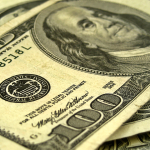There are now more $100 U.S. bills than $1 bills in the world, a seemingly absurd fact that holds some big lessons about the global financial system—especially for the cryptocurrency advocates who are trying to reshape it.
The switch happened by 2017, according to a report last week from The Washington Post. The U.S. Federal Reserve, which oversees the printing of bills, doesn’t seem concerned about the shift: the production of $100 bills is actually accelerating, according to the Post.
Much of the demand for high-denomination dollar cash comes from countries with weak homegrown currencies. About 80 percent of the $100 bills in circulation are outside of the U.S., according to a Federal Reserve study by economist Ruth Judson. Judson has also found that political instability is the main driver of demand for U.S. dollars. Countries including El Salvador, Ecuador, and Zimbabwe have either effectively or officially adopted the dollar as their sole currency.
The popularity of dollars worldwide, in whatever form or denomination, has large benefits for the U.S. economy. In the post-World War II era, global demand for dollars allowed the U.S. to import more than it exported, raising the U.S. standard of living substantially. According to no less an authority than former Federal Reserve Chairman Ben Bernanke, the dollar’s global reserve status amounts to “an interest-free loan to the United States,” leading to about $20 billion a year in savings (a relatively small amount in the grand scheme of things). It also reduces borrowing risk for the U.S.: dollar-denominated debt is an ongoing threat to the financial stability of many emerging markets, since big exchange-rate swings can make those loans harder to pay back in local currency.
If "bitcoinization" takes the same path as "dollarization," the rising demand would send the price of the winning cryptocurrency into the stratosphere, letting early investors reap some of the rewards that had formerly accrued to the United States.
Exporting dollars, and $100s specifically, may have another negative impact on the very economies where it is most in-demand. Speaking to CNBC, currency researcher Nicholas Colas argued that the rise of $100 bill circulation “is an enabler of corruption” globally, both because the bills enable bribes, and because they can be used to “keep assets outside of the financial system.” As we explored in our conversation with author David Montero, corporate bribery has had devastating impacts on the citizens of developing countries, particularly thanks to companies skirting environmental and health regulations.
Get the BREAKERMAG newsletter, a weekly roundup of blockchain business and culture.
The continued rise of cash dollars has several implications for cryptocurrency, particularly for the group known as “bitcoin maximalists.” It suggests, for one, there is a natural dynamic towards shared global trust in a single currency, in part because it reduces exchange friction. That dominant currency is dollars now, but bitcoin maximalists argue that bitcoin or a similar cryptocurrency could eventually take that position. Early hints of that future have emerged in Cyprus and, more recently, Venezuela. If “bitcoinization” takes the same path as “dollarization,” the rising demand would send the price of the winning cryptocurrency into the stratosphere, letting early investors reap some of the rewards that had formerly accrued to the United States.
It’s also important to note that, whatever the negative systemic impact of high-denomination dollar cash, the popularity of cash in general hinges partly on something the crypto community strongly supports: financial privacy. The disappearance of higher-denomination cash from circulation, including the withdrawal of 500 Euro bills that began in 2016, could be seen as part of a gradual push towards a fully electronic global money system.
If that electronic system is controlled by legacy banks and national governments, it creates more opportunities for authoritarian systems like China’s to impose limits on individual behavior—driving home the need for the uncensorable alternative provided by bitcoin and its successors. One of the most complex but important debates in coming years will be whether that bulwark against authoritarianism is worth enabling money laundering, corruption, and other crimes of the sort currently fueled by good old Ben Franklins.
Image: 401kcalculator.org.
